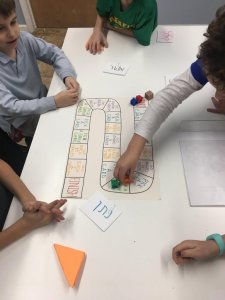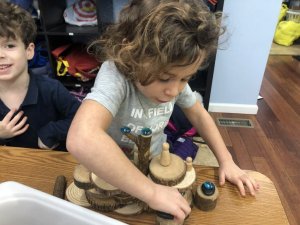
King Shlomo was well known for a few things: he built the Temple, he was super wise, and he wrote a lot of songs and poems. Last week we took a deep dive into the wisdom Shlomo exhibited in his leadership style in order to get the Temple built. Here are some of the discoveries we made, and some of the wisdom our students had to share about it.

David was a king who fought a lot of wars. Our learners concluded that he was probably a fighter, fierce, and brave. We wondered why God didn’t want David to build the Temple. The kiddos suggested that the Temple should be a peaceful place for praying. So God wanted Shlomo, who was king during times of peace, to build it instead. We reflected on whether the kind of person who creates something influences what the thing is. For instance, does it make sense that so many structures, activities, toys, etc. for kids are created by adults? Or is it hard to believe that a place is intended to be peaceful if the person who creates it is not a peaceful person?

Beverly asked the shorashim (first graders) whether they would believe that they should really be kind if the Makom teachers were always unkind to them or to each other.
- Yes, that would be difficult. People should be an example for what they’re asking for.
- It’s hard to trust someone who is asking for a thing they’re not doing.
- Well, I already know how to be kind and that it’s not good to copy someone who is making bad choices.
- Sometimes if I notice people not doing the thing they’re asking for, I can help remind them to do it too. Like when I helped my friends make better choices and stop fighting.

Building the Temple was a huge undertaking. Shlomo needed a lot of support, both from his own people and from his neighbors, in order to make it happen. We unpacked some of the methods he used as a leader to get what he wanted. Here are some leadership strategies Shlomo uses and some characteristics of what each one is:
- Asking nicely: it’s a question, depends on tone, includes “please”
- Flattery: compliments, can be insincere
- Bribe or barter: a trade, if you do X then I’ll do Y
- Demand: order, commanding tone, not very kind
- Threat: do X or else something bad or harmful will happen to you

What makes a leadership strategy good and effective?
- If it’s kind
- If it’s honest (don’t offer a trade and then not follow through on it)
- If what you’re asking for includes something that people already want

What leadership strategies would you use to get a group of people to clean up?
- Offer a reward
- Do it all myself for the reward
- Clean up half myself and then ask them to do the other half
- Make a game out of cleaning up
What leadership strategies would you use to get a group of people to draw a picture?
- Say please and give them what they need to do it.
- Offer an exchange. Say, “I’ll make you a picture of your favorite animal. Will you make me a picture of my favorite animal?”
- Make my mom do it if they don’t listen.

The last thing I’d like to leave you with is these fabulous words of wisdom from our learners. The first half of each of these proverbs is a quote from Shlomo. The second half is a quote from our learners. Enjoy!
- Good things are given to those who… are good.
- A good reputation is better than… to have candy.
- Your own soul is nourished when you are… well fed and hugged.
- A happy heart is as good as… loving.
- It’s better to be poor and honest than… to ask for money.
- Teach a child what choices to make, and when they grow up… they will do the right thing.
- If you try to hide your mistakes… there you go to time out.
- Good things are given to those who… listen.
- When you act like you know you’re right… you’re smart.
- Happy is the person who has found… 1000 rocks.
- Respect for God makes life… fun.
- Do yourself a favor and love… yourself, your family, and each other.
- Learn all you can, then your life will… change.
